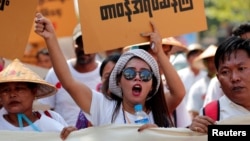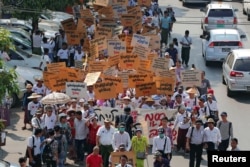Proposals put forward by Myanmar’s government to add further restrictions to a controversial assembly law have attracted widespread criticism, with rights groups accusing the civilian-led government of backsliding on democratic progress.
On March 7, the country’s Upper House approved amendments to the Peaceful Assembly and Peaceful Procession Law, which would include potential three-year jail terms for anybody deemed to have supported, financially or otherwise, a protest that has the intention to “break national security, rule of law, public order or public morals.”
The proposed amendments come after a series of protests in the country, including one against a deadly government crackdown in Mrauk U, Rakhine State, in the west, and the killing of rebel soldiers from Kayah State, in the east.
Nationalist groups have also become increasingly vocal in recent months, particularly in the aftermath of the crisis in Rakhine State, for which Myanmar’s government and its military have attracted considerable international criticism.
Opposition to amendments
The proposed amendments have been met with a significant backlash from several quarters.
On March 5, hundreds of protesters marched through downtown Yangon against the proposed changes, holding placards and chanting slogans that accused the government of attacking freedom of expression.
“We don’t accept the proposal to the Assembly Act,” said Thet Swe Win, one of the march’s organizers. “It is not according to democratic standards.”
Thet Swe Win told VOA that the changes were a retreat from democratic progress in the country.
“This proposal is so they can arrest whoever they want. This is improper and undemocratic,” he said.
Despite the country being ruled by Aung San Suu Kyi’s National League for Democracy (NLD), which many hoped would bring an era of political reform to the country, those protesting against the changes have found an unlikely ally in the form of military-appointed lawmakers, who have spoken out against the proposed amendments.
“I object to it because it is not in line with democratic standards,” said Lieutenant Colonel Tin Lin Oo, a Tatmadaw MP, during a parliamentary session to discuss the changes. “[The amendments] should not be promulgated. There’s already a law enacted under which the Myanmar Police Force will warn if things are in confusion, and not in accordance with the regulations.”
Government will not comment
Several senior officials from the NLD refused to comment when contacted by VOA to discuss the issue, and it is unclear what the reasons are behind the proposed changes, which have attracted criticism from both inside and outside the country.
“With dozens of peaceful protesters wrongfully arrested under the existing version of the law since the National League for Democracy came to power, these amendments are a step in the wrong direction,” said Brad Adams, executive director of the Asian division of Human Rights Watch. “Parliament should heed the call of Burmese civil society groups and withdraw the bill,” he said, adding the proposed moves were “a major step backwards.”
Lawmakers from elsewhere in the nation have also criticized the proposed move, saying they represent a backsliding of democratic progress.
Retreat from democracy?
“If passed, the amendments would not only stifle freedom of expression and peaceful assembly, but would also mark a significant shrinking of democratic space in Myanmar,” said Teddy Baguilat, a Philippines congressman, who is also a board member of the ASEAN Parliamentarians for Human Rights.
“Many are ambiguously defined and significantly widen opportunities for the authorities to further criminalize peaceful protests under a law that had already been used numerous times against students, farmers, and journalists,” said Baguilat.
Additional reporting from Aung Naing Soe in Yangon.















